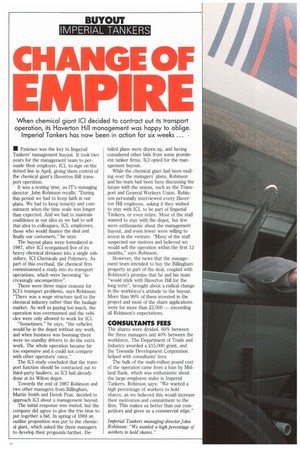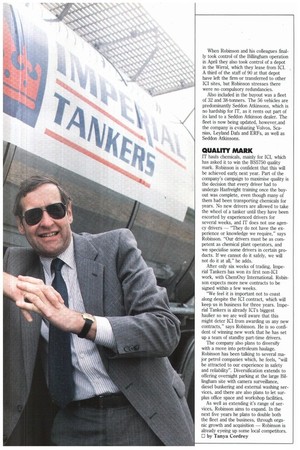CHANGE OF
Page 48

Page 49

If you've noticed an error in this article please click here to report it so we can fix it.
EMI) 111;
When chemical giant ICI decided to contract out its transport operation, its Haverton Hill management was happy to oblige. Imperial Tankers has now been in action for six weeks ...
• Patience was the key to Imperial Tankers' management buyout. It took two years for the management team to persuade their employer, ICI, to sign on the dotted line in April, giving them control of the chemical giant's Haverton Hill transport operation.
It was a testing time, as IT's managing director John Robinson recalls: "During this period we had to keep faith in our plans. We had to keep tenacity and commitment when the time scale was longer than expected. And we had to maintain confidence in our idea as we had to sell that idea to colleagues, ICI, employees, those who would finance the deal and finally our customers," he says.
The buyout plans were formulated in 1987, after ICI reorganised five of its heavy chemical divisions into a single subsidiary, ICI Chemicals and Polymers. As part of this overhaul, the chemical firm commissioned a study into its transport operations, which were becoming "increasingly uncompetitive".
There were three major reasons for ICI's transport problems, says Robinson: "There was a wage structure tied to the chemical industry rather than the haulage market. As well as paying too much, the operation was overmanned and the vehicles were only allowed to work for ICI.
"Sometimes," he says, "the vehicles would be in the depot without any work, and when business was booming there were no standby drivers to do the extra work. The whole operation became far too expensive and it could not compete with other operators' rates."
The ICI study concluded that the transport function should be contracted out to third-party hauliers, as ICI had already done at its Wilton depot.
Towards the end of 1987 Robinson and two other managers from Billingham, Martin Smith and Derek Peat, decided to approach ICI about a management buyout.
The initial response was muted, but the company did agree to give the trio time to put together a bid. In spring of 1988 an outline proposition was put to the chemical giant, which asked the three managers to develop their proposals further. De tailed plans were drawn up, and having considered other bids from some prominent tanker firms, ICI opted for the management buyout.
While the chemical giant had been mulling over the managers' plans, Robinson and his team had been busy discussing the future with the unions, such as the Transport and General Workers Union. Robinson personally interviewed every Haverton Hill employee, asking if they wished to stay with ICI, to be part of Imperial Tankers, or even retire. Most of the staff wanted to stay with the depot, but few were enthusiastic about the management buyout, and even fewer were willing to invest in the venture. "Many of the staff suspected our motives and believed we would sell the operation within the first 12 months," says Robinson.
However, the news that the management team intended to buy the Billingham property as part of the deal, coupled with Robinson's promise that he and his team "would stick with Haverton Hill for the long term", brought about a radical change in the workforce's attitude to the buyout. More than 90% of them invested in the project and most of the share applications were for more than 22,000 — exceeding all Robinson's expectations.
CONSULTANTS FEES
The shares were divided, 60% between the three managers and 40% between the workforce. The Department of Trade and Industry awarded a £15,000 grant, and the Teesside Development Corporation helped with consultants' fees.
The bulk of the multi-million pound cost of the operation came from a loan by Midland Bank, which was enthusiastic about the large employee stake in Imperial Tankers. Robinson says: "We wanted a high percentage of workers to hold shares, as we believed this would increase their motivation and commitment to the firm. This makes us better than our competitors and gives us a commercial edge." When Robinson and his colleagues finally took control of the Billingham operation in April they also took control of a depot in the Wirral, which they lease from ICI. A third of the staff of 90 at that depot have left the firm-or transferred to other ICI sites, but Robinson stresses there were no compulsory redundancies.
Also included in the buyout was a fleet of 32 and 38-tonners. The 56 vehicles are predominantly Seddon Atkinsons, which is no hardship for IT, as it rents out part of its land to a Seddon Atkinson dealer. The fleet is now being updated, however,and the company is evaluating Volvos, Scanias, Leyland Dafs and ERFs, as well as Seddon Atkinsons.
QUALITY MARK
IT hauls chemicals, mainly for ICI, which has asked it to win the BS5750 quality mark. Robinson is confident that this will be achieved early, next year. Part of the company's campaign to maximise quality is the decision that every driver had to undergo Hazfreight training once the buyout was complete, even though many of them had been transporting chemicals for years. No new drivers are allowed to take the wheel of a tanker until they have been escorted by experienced drivers for several weeks, and IT does not use agency drivers — "They do not have the experience or knowledge we require," says Robinson. "Our drivers must be as competent as chemical plant operators, and we specialise some drivers in certain products. If we cannot do it safely, we will not do it at all," he adds.
After only six weeks of trading, Imperial Tankers has won its first non-IC1 work, with ChemOxy International. Robinson expects more new contracts to be signed within a few weeks.
"We feel it is important not to coast along despite the ICI contract, which will keep us in business for three years. Imperial Tankers is already ICI's biggest haulier so we are well aware that this might deter ICI from awarding us any new contracts," says Robinson. He is so confident of winning new work that he has set up a team of standby part-time drivers.
The company also plans to diversify with a move into petroleum haulage. Robinson has been talking to several major petrol companies which, he feels, "will be attracted to our experience in safety and reliability". Diversification extends to offering overnight parking at the large Billingham site with camera surveillance, diesel bunkering and external washing services, and there are also plans to let surplus office space and workshop facilities.
As well as extending it's range of services, Robinson aims to expand. In the next five years he plans to double both the fleet and the business, through organic growth and acquisition — Robinson is already eyeing up some local competitors. 0 by Tanya Cordrey












































































































































